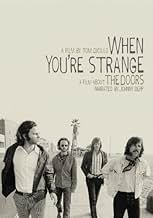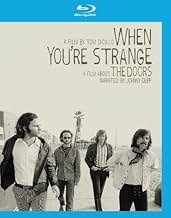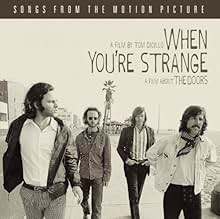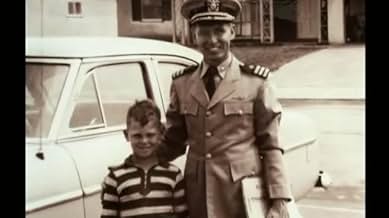A look at the late '60s and early '70s rock band The Doors, including rare exclusive footage.A look at the late '60s and early '70s rock band The Doors, including rare exclusive footage.A look at the late '60s and early '70s rock band The Doors, including rare exclusive footage.
- Awards
- 2 wins & 1 nomination total
Johnny Depp
- Narrator
- (voice)
John Densmore
- Self
- (archive footage)
Robby Krieger
- Self
- (archive footage)
Ray Manzarek
- Self
- (archive footage)
Jim Morrison
- Self
- (archive footage)
Pamela Courson
- Self
- (archive footage)
- (as Pam Courson)
The Doors
- Themselves
- (archive footage)
Murray Goodman
- Self - Judge
- (archive footage)
Jimi Hendrix
- Self
- (archive footage)
Lyndon B. Johnson
- Self
- (archive footage)
- (as Lyndon Johnson)
George S. Morrison
- Self - Jim's Father
- (as Admiral George S. Morrison)
Paul A. Rothchild
- Self
- (archive footage)
Adolf Hitler
- Self
- (archive footage)
- (uncredited)
Janis Joplin
- Self
- (archive footage)
- (uncredited)
John F. Kennedy
- Self
- (archive footage)
- (uncredited)
Robert F. Kennedy
- Self
- (archive footage)
- (uncredited)
- Director
- Writer
- All cast & crew
- Production, box office & more at IMDbPro
Featured reviews
I'm a big fan of The Doors and pretty much knew the story before watching this film. And yet I found Johnny Depp to be a very convincing narrator (usually I find narrators to be quite annoying in documentaries!), and the film was quite fluid and easy to watch. Some really cool footage as well! For anyone who's interested, Oliver Stone's 1992 film The Doors is a good and fairly accurate non-documentary worth watching, if you haven't seen it already.
When You're Strange is made up of all archival footage, clips taken from some famous scenes (i.e. Ed Sullivan Show appearance, intro's at the airport, infamous concert) and not-so-famous ones (clips from the rarely seen films Highway and Feast of Friends are seen here), and it's done in what could be called objectively adulatory. That might not make sense, but what Tom DiCillo wants to show is what the Doors were like, the times they were in, and what was up with their frontman, Jim Morrison, who was with the band for five years before dying one night in a bathtub under mysterious circumstances. At the same time as he's giving us the facts via narration read by Johnny Depp, and with the footage, he wants the audience to see what was so unique about the Doors, their strange appeal as rock figures unlike anyone else at the time; there were other hippie-rock bands, and other poets, and other blues bands, but not quite in this combination.
For the newcomers, the documentary basically tells you everything you need to know, or would care to know, about Jim Morrison and the Doors. I mention his name first because, as a liability with the documentary for fans, it doesn't really go that much into the other members' lives at the time. Perhaps DiCillo saw that not a lot of interest was really there with Ray Manzarek, Robby Krieger and John Densmore (comparatively to Jim, the documentary might tell us, they were very much normal, save for trading off from acid to meditation), or that Morrison is such a dynamic figure- an icon to some, just another wasted rocker to others- that he'd have to take up the screen time. A similar issue could be taken with Oliver Stone's bio-pic - on the other hand, as the film makes pretty clear, after Morrison died, the Doors were practically bust (the doc fails to mention that the band actually *did* go on to make a couple of albums in the 70's, both huge flops, and cynically tour a few years ago as "The 21st Century Doors", but I digress).
An issue can be taken with nothing too new being given to us historically about the band, and (more-so) that DiCillo frames it into the history we've seen so often: tumultuous times, upheaval of society, Johnson and Nixon's Vietnam and domestic policies, Kennedy and MLK assassinations and Charles Manson and Kent etc etc. But what works best is when we can focus on the band as a whole, what made them different, how they somehow gelled together as equal parts blues, poetry, psychedelia, jazz, rock, whatever, in how they approached the songs (no bass player for one thing) and how they recorded tracks. One of the more fascinating aspects is hearing how long the creative process took; their best albums took mere days to record (self-titled debut and LA Woman) while a mixed-bag of pop-tunes like The Soft Parade took nearly a year.
And in the middle, like a vortex of leather and hair and strikingly handsome (or as some might say "Hawt") lead figure, Jim Morrison takes up a lot of the airtime. He's an intriguing, baffling figure, how a man with such talent and natural charisma, as a singer and a writer, felt insecure about himself and also became "Jimbo" as Manzarek called him, a wild alter-ego on stage that made a split between those who wanted the Doors, and those that wanted to spectacle of "JIM". He doesn't come off too well as a person ultimately, as a philanderer and alcoholic and sometimes just cruel person... but at the end of it all, his creative output with the Doors in a few years amounted to more than some rock bands can get in decades of work. Again, this is nothing too new to realize, and some of the big facts are so well covered as to be like pop-legend. But DiCillo does a thorough job putting it altogether, and, substantively (if not as a visionary experience) it trumps Stone's film.
For the newcomers, the documentary basically tells you everything you need to know, or would care to know, about Jim Morrison and the Doors. I mention his name first because, as a liability with the documentary for fans, it doesn't really go that much into the other members' lives at the time. Perhaps DiCillo saw that not a lot of interest was really there with Ray Manzarek, Robby Krieger and John Densmore (comparatively to Jim, the documentary might tell us, they were very much normal, save for trading off from acid to meditation), or that Morrison is such a dynamic figure- an icon to some, just another wasted rocker to others- that he'd have to take up the screen time. A similar issue could be taken with Oliver Stone's bio-pic - on the other hand, as the film makes pretty clear, after Morrison died, the Doors were practically bust (the doc fails to mention that the band actually *did* go on to make a couple of albums in the 70's, both huge flops, and cynically tour a few years ago as "The 21st Century Doors", but I digress).
An issue can be taken with nothing too new being given to us historically about the band, and (more-so) that DiCillo frames it into the history we've seen so often: tumultuous times, upheaval of society, Johnson and Nixon's Vietnam and domestic policies, Kennedy and MLK assassinations and Charles Manson and Kent etc etc. But what works best is when we can focus on the band as a whole, what made them different, how they somehow gelled together as equal parts blues, poetry, psychedelia, jazz, rock, whatever, in how they approached the songs (no bass player for one thing) and how they recorded tracks. One of the more fascinating aspects is hearing how long the creative process took; their best albums took mere days to record (self-titled debut and LA Woman) while a mixed-bag of pop-tunes like The Soft Parade took nearly a year.
And in the middle, like a vortex of leather and hair and strikingly handsome (or as some might say "Hawt") lead figure, Jim Morrison takes up a lot of the airtime. He's an intriguing, baffling figure, how a man with such talent and natural charisma, as a singer and a writer, felt insecure about himself and also became "Jimbo" as Manzarek called him, a wild alter-ego on stage that made a split between those who wanted the Doors, and those that wanted to spectacle of "JIM". He doesn't come off too well as a person ultimately, as a philanderer and alcoholic and sometimes just cruel person... but at the end of it all, his creative output with the Doors in a few years amounted to more than some rock bands can get in decades of work. Again, this is nothing too new to realize, and some of the big facts are so well covered as to be like pop-legend. But DiCillo does a thorough job putting it altogether, and, substantively (if not as a visionary experience) it trumps Stone's film.
Having been a fan for over 20 years, I'm fairly jaded when it comes to bios on the Doors. The new footage and DiCillo's narrative structure offer a truly fresh look at the subject matter, since it's the first time I've really felt I've had an insider's view on the band. Morrison is treated like a real human being, stripped of all the legend and bombast. Instead of the pretentious rock star, you get to see Jim the person evolving over time, with all the joy and suffering that he experienced. There's a shot of him exiting the courtroom in Miami with a look of vulnerability that I found shocking, as it's at odds with image of the cool, cocky singer. The history of the band is subtly told though a wash of images and sparse narration which touch all the milestones without feeling like another retread. It definitely deserves another viewing, consider me a confirmed buyer of the DVD.
10rtcblc
I was able to see this at Sundance this morning. What an outstanding film!! By weaving original footage from many sources including takes from a movie Jim Morrison made himself Mr. DiCillo presents an intimate view of all the DOORS in the context of the 60's and early 70's. An intimate look at the complex relationships between Morrison and the other members and hugely entertaining. DiCillo spoke at the end of the movie and during the Q&A's he mentioned one critic accused him of "recreating" footage in the film. The supposed recreated footage was actually Morrisons own film starring himself. This rumor is extremely frustrating to DiCillo as it is spreading via the internet. See for yourself, this is a excellent movie. I asked DiCillo if he had cooperation from Morrison's family. He said he had a lot of help from Morrisons family especially on the relationship between Jim and his father. I hope someone picks it up for distribution. I'd go again.
"When You're Strange" is a music Documentary, which takes you through the short career of a world famous 1960's band, The Doors.
For this alone, the documentary is worth watching. That said, this is so interesting to watch, because it is a story with so many levels, mainly because it took place in a time, when things were changing.
It was the 1960s. A still growing group of people invented in the 50s, namely the young, could and would not be ignored any longer. As Morrison put it: 'we want the world, and we want it now' To them things were not black and white anymore. Men and women were not men and women, but human beings. The solution was definitely not war, but the absolute opposite. On the other hand the parents, and older generations, were stubbornly holding on to the old order and its values, and a larger and larger gap was growing between these two fronts.
The spotlight in this film is heavily focused on the Doors most famous member, Jim Morrison, and for a good reason. Jim Morrison became a clear symbol of the new, and the young, mainly because he wanted more out of life than the norms allowed, and simply went for it. On top of this, Jim had an interesting background, which is a prime example of the generation gap. Jim Morrisons father George Morrison was an admiral in the navy, and was involved in the Vietnam war. He was against Jim's involvement in rock music, wanted his hair cut, and to get an education. Jim ignored his parents to such an extend that he claimed his family dead, when asked by journalists.
If you know the story of The Doors and Jim Morrison already, this will be a stringent summary of the events with a well written and good narration by Johnny Depp. There is nothing new in the story itself and thankfully no conspiracy theories about Morrisons death. Where this documentary really shines and adds yet another level, is through the footage and the way this is put together. Some of this footage has never been shown before, and parts of it is still so crisp and clear that it's eerie. It is bound to send you on an emotional ride, if you were a fan when it mattered the most - when you were young.
So in conclusion this falls two stars shy of ten because of the only fall through i noticed. When a letter from Morrisons father is brought up, it mentions only one paragraph of this well meaning letter, and uses it out of context to create drama. This is a 2 star fail in an otherwise clear cut and to the bone fact telling documentary.
For this alone, the documentary is worth watching. That said, this is so interesting to watch, because it is a story with so many levels, mainly because it took place in a time, when things were changing.
It was the 1960s. A still growing group of people invented in the 50s, namely the young, could and would not be ignored any longer. As Morrison put it: 'we want the world, and we want it now' To them things were not black and white anymore. Men and women were not men and women, but human beings. The solution was definitely not war, but the absolute opposite. On the other hand the parents, and older generations, were stubbornly holding on to the old order and its values, and a larger and larger gap was growing between these two fronts.
The spotlight in this film is heavily focused on the Doors most famous member, Jim Morrison, and for a good reason. Jim Morrison became a clear symbol of the new, and the young, mainly because he wanted more out of life than the norms allowed, and simply went for it. On top of this, Jim had an interesting background, which is a prime example of the generation gap. Jim Morrisons father George Morrison was an admiral in the navy, and was involved in the Vietnam war. He was against Jim's involvement in rock music, wanted his hair cut, and to get an education. Jim ignored his parents to such an extend that he claimed his family dead, when asked by journalists.
If you know the story of The Doors and Jim Morrison already, this will be a stringent summary of the events with a well written and good narration by Johnny Depp. There is nothing new in the story itself and thankfully no conspiracy theories about Morrisons death. Where this documentary really shines and adds yet another level, is through the footage and the way this is put together. Some of this footage has never been shown before, and parts of it is still so crisp and clear that it's eerie. It is bound to send you on an emotional ride, if you were a fan when it mattered the most - when you were young.
So in conclusion this falls two stars shy of ten because of the only fall through i noticed. When a letter from Morrisons father is brought up, it mentions only one paragraph of this well meaning letter, and uses it out of context to create drama. This is a 2 star fail in an otherwise clear cut and to the bone fact telling documentary.
Did you know
- TriviaFor the first time in the band's history unprecedented access was granted, regarding the previously unseen footage of Jim Morrison.
- GoofsA mock newspaper clipping announces both that Sharon Tate and her friends have been found murdered and that Charles Manson and his "Family" are suspected. Manson and the "Family" were not identified as the Tate killers until December 1969, more than four months after the murders happened.
- Quotes
Jim Morrison: The music can't help but reflecting things that are happening around you
- ConnectionsEdited from Feast of Friends (1969)
- How long is When You're Strange?Powered by Alexa
Details
- Release date
- Country of origin
- Official site
- Language
- Also known as
- The Doors. When you're strange
- See more company credits at IMDbPro
Box office
- Gross US & Canada
- $246,078
- Opening weekend US & Canada
- $66,833
- Apr 11, 2010
- Gross worldwide
- $1,194,182
- Runtime
- 1h 26m(86 min)
- Color
- Sound mix
- Aspect ratio
- 1.85 : 1
Contribute to this page
Suggest an edit or add missing content

































